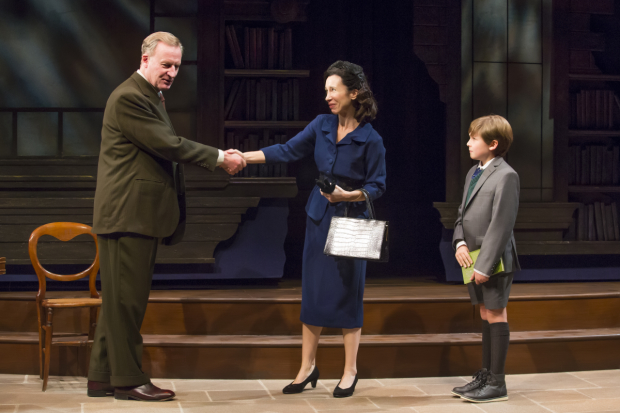Shadowlands

(© Jeremy Daniel)
"If God loves us, why does He allow us to suffer so much?" Richard Dawkins couldn't spread the seed of atheism faster than have all the unsatisfying answers to that question. C.S. Lewis, one of history's most beloved Christian apologists, rationalized pain as God's "megaphone to rouse a deaf world." But that was 20 years before his own life's greatest agony. In under a decade, Lewis met, married, and lost the love of his life — American writer Joy Davidman, who died of cancer in 1960 at the age of 45. When cosmic injustice is felt so acutely, being asked to remain grateful for God's rousing megaphone is like rubbing salt in an open wound.
It's the eloquent articulation of this secondary sting that makes William Nicholson's Shadowlands (a 1991 Tony nominee for Best Play) such an incisive piece of writing. And as a mouthpiece for these metaphysical musings, it doesn't get much better than Daniel Gerroll, who stars as C.S. Lewis in the Fellowship for Performing Arts revival, directed by Christa Scott-Reed, off-Broadway at the Acorn Theatre. Gerroll is not in the business of imitation — neither physically nor vocally re-creating the author's notable British bluster (in good company with Anthony Hopkins who also stuck to his own accent for the 1993 film version). And yet, Gerroll is infinitely truthful in his manner of blending intellectual confidence with emotional uncertainty, the conflict at the heart of Shadowlands, which extends a hand to the faithful and faithless alike. Religion, after all, has not cornered the market on faith, and it can be just as easily shaken for those who lean on science as for those braced by God.
As someone who famously approached life with an academic mind, inquisitive spirit, and playful imagination (including penning the fanciful Chronicles of Narnia series), Lewis (or Jack, as he is more familiarly called) is well-matched with Joy Davidman (as is Gerroll with the excellent Robin Abramson who plays her). After two years of correspondence, they meet in person when she travels from America to the U.K. with her son, Douglas (alternately played by Jack McCarthy and Jacob Morrell), and develop their friendship further when she divorces her husband and moves to Oxford full-time. She's a poet, a religious wanderer, and an outspoken thinker who doesn't shy away from challenging Jack's work, and he, though at first resistant to his deep well of emotions, is thoroughly enraptured.
As she was in real life, Joy is widely disliked by Jack's peers, particularly his fellow academic Christopher Riley (played by the quietly acerbic Sean Gormley) and his brother Warnie (John C. Vennema giving a comically understated picture of British stoicism as Joy continues to inconvenience his very existence). Her candor is understandably distasteful to a certain sect of British society, but with every retort she delivers with her thick New York accent, Abramson only makes Joy increasingly lovable in her unapologetic humanity.
Gerroll and Abramson are charming stage partners, and it's a delight to see their characters' friendship turn to love, with marriage (for citizenship purposes only) in between. Only after a cancer diagnosis puts a demonstrable limit on their time together does Jack shirk the rules of Christian matrimony and marry Joy before God. Their days together are numbered, but he maintains a modicum of comfort in his belief that the mortal world is just a collection of shadows that preface the realer reality that awaits us after death.
For a world of shadows, Kelly James Tighe's set feels rather dense (with the exception of a Narnia-esque wonderland to which the young Douglas occasionally escapes as his mother's health declines). Two thick panels separate the lip of the stage, where Gerroll delivers his direct addresses, from his character's dusty home stacked with books and old furniture. Then again, this world of shadows all too often feels painfully real — and the less it bends to our whims, the harder it is to believe that anything truer lies on the other side. Faith, as always, is disconcertingly blind, but it's worth remembering that happiness is blinder. It never alerts us to the pain at the end of the euphoria — and yet we take the leap.










